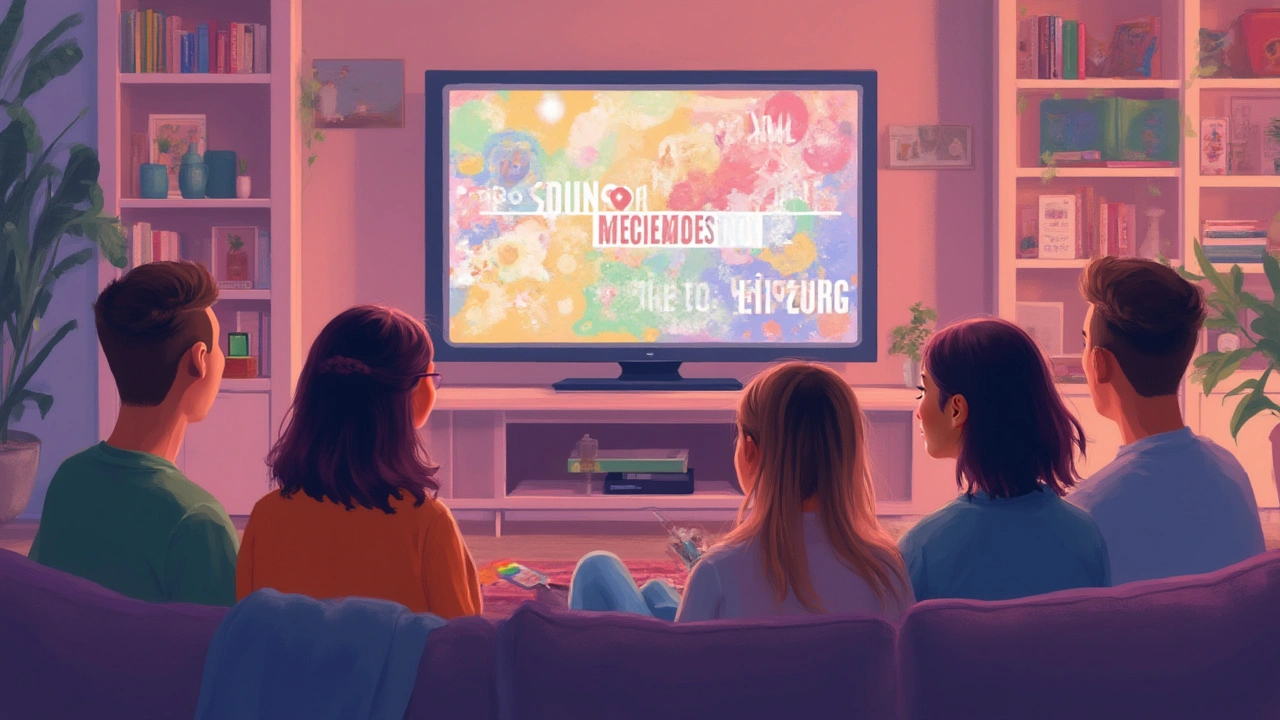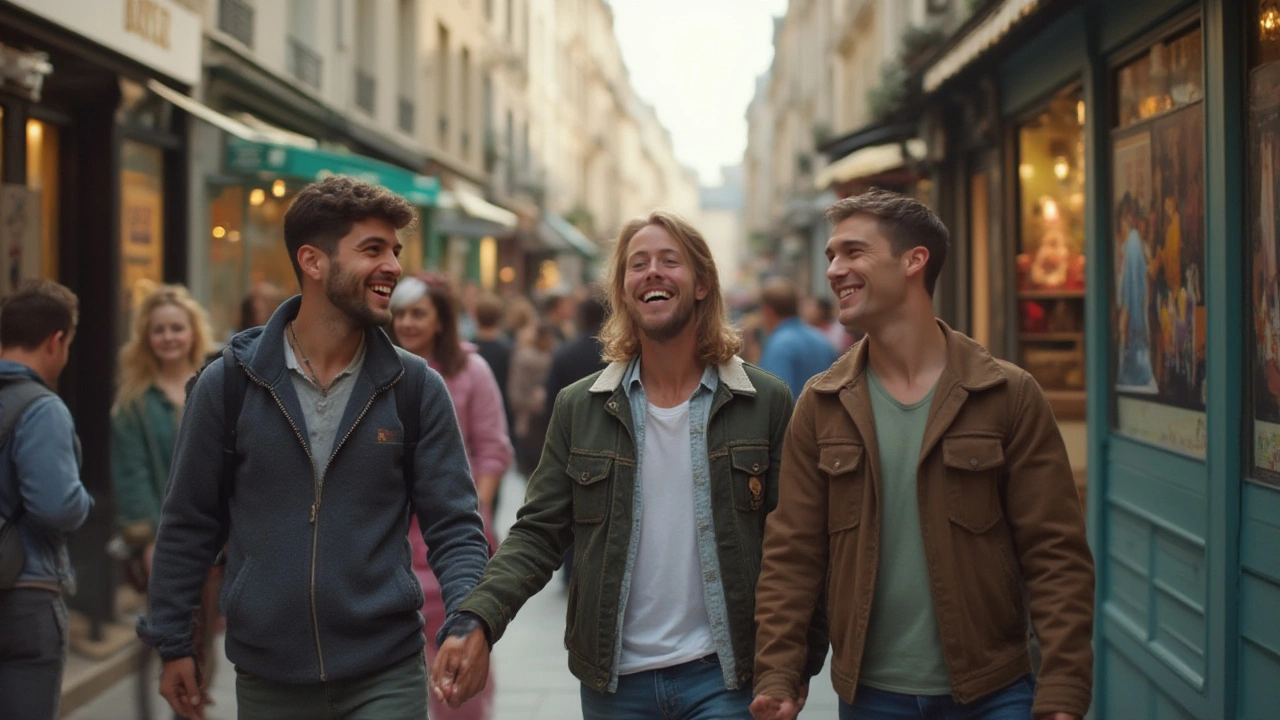Picture this: rue de Rivoli, a warm night in June, rainbow confetti swirling through the air. That’s the Paris I know—joyfully unapologetic during the annual Marche des Fiertés. But if you flip on your TV or scroll through the latest Parisian streaming releases, you’ll still spot old clichés, and sometimes glaring gaps, about sexual identities. Sexual diversity Paris makes headlines with its vibrant community events, wild club nights in Le Marais, and fashion-forward drag artistry, but French screens have had to play catch-up. This tug-of-war between old stereotypes and fresh, unfiltered stories is shaping what millions see and believe about LGBTQ+ life—not just in Paris, but across France. So, what exactly is happening on-screen, and how much are things really changing for those of us living it every day?
The Landscape of Sexual Diversity in French Media
From the classic black-and-white flicks of the Nouvelle Vague to the glossy drama of "Dix Pour Cent" (Call My Agent!), French media’s had a complicated relationship with sexual diversity. For years, LGBTQ+ characters existed mostly as walking, talking punchlines or tragic victims. It’s only in recent decades that TV and cinema in Paris began flipping the script. Look at programs like "SKAM France," which gave the audience a raw, honest depiction of teens exploring their sexual and gender identities, and "Les Engagés," which follows activists fighting for LGBTQ+ rights in Lyon but resonates deeply with Parisians, too.
French TV’s shift didn’t come out of nowhere. In 2013, the legalisation of same-sex marriage sent shockwaves through Paris. Place de la République became ground zero for protests, rallies, and celebrations that attracted international headlines. The city’s newfound openness began creeping into mainstream media, scratching beneath the surface of stereotypes and giving faces and voices to France’s diverse LGBTQ+ population. Suddenly, it wasn’t just about flamboyant sidekicks or tortured artists; real Parisian stories started appearing, awkward first kisses in lycée courtyards, queer families navigating the system, ambitious professionals in the 11th arrondissement balancing identity and career.
Yet, these stories face challenges. A study published in 2024 by Observatoire de la Diversité showed LGBTQ+ characters make up just 6% of all roles on major French channels. In fact, most LGBTQ+ visibility is still confined to late-evening slots or digital streaming services, far away from the prime-time possibilities enjoyed by straight, cisgender characters. Programs run by Canal+ and France 2 have made notable strides, especially after the public push following shows like "Plus Belle La Vie"—that iconic Marseille-set soap now hailed for its nuanced presentation of same-sex couples and transgender experiences. But the fight for balanced, stereotype-free screen time is still very real.
Streaming has shifted the landscape. Netflix France, for example, has invested heavily in original content with diverse casts. Think of shows like "Lupin"—not an LGBTQ+ series, but proof that international platforms are open to stories that break the mold. Amazon Prime’s "Mixte" and, closer to home, Arte’s documentaries on Parisian transgender communities, draw in younger, curious viewers tired of reruns of tired stereotypes. These new avenues are shaking up the old model—sometimes faster than the old guard can handle.
| Year | Estimated LGBTQ+ Characters on TV | Prime-Time Presence (%) |
|---|---|---|
| 2015 | 25 | 2.5% |
| 2020 | 67 | 4.1% |
| 2024 | 112 | 6.0% |
Paris sets the pace for the national discussion. Where else but at Studio Galande’s annual Queer Cinema Festival can you rub elbows with A-list directors and drag icons? The city’s appetite for representation—through award-winning films or candid web series—pushes the national networks to follow.
Breaking Parisian and National Stereotypes
Old labels die hard. For decades, French cinema leaned into the trope of the tragic queer character—think of André Téchiné’s "Les Roseaux Sauvages" or the tortured love in "La Vie d’Adèle" (Blue is the Warmest Colour). Parisian nightlife, hailed as among the most accepting in Europe, is painted as exclusively flamboyant, ignoring the rich spectrum of queer experiences you'll find in arrondissements from Pigalle to Belleville.
As stereotypes crumble, broadcast and streaming creators are more aware of nuance. The TV show "Osmosis," partly filmed in the 10th arrondissement, nails modern romance—including bisexual, pansexual, and non-binary characters—without slapping on labels for the sake of diversity points. Documentaries such as France 3’s "Transidentités: Parlons-en!" feature everyday Parisians sharing raw, unscripted coming-out stories that feel nothing like the melodramas of decades past.
French traditions influence this evolution, too. Parisians, famously protective of personal privacy (la vie privée), now see themselves in characters who refuse to be boxed in by their sexuality. The rise of micro-series like "Fiertés" (Pride)—three episodes tracking one man’s journey from the late '70s to marriage equality—echoes the real, generational struggles faced in Parisian homes and among political activists. Café debates spill onto podcasts and YouTube channels hosted by young, queer Parisians determined to claim their voices without caricature.
Breaking stereotypes isn’t just up to journalists or showrunners; it’s a team effort, tapped into Parisian traditions of activism and art. Look at the performance art at La Mutinerie, a lesbian bar and community space near Canal Saint-Martin, where drag kings and spoken-word poets dismantle gender roles in front of packed, often mixed audiences. Or the zines and graphic novels at Librairie Violette and Co, which serve as blueprints for independent filmmakers in need of authentic perspectives. Even Paris Fashion Week reflects this change—the 2025 edition featured openly trans designers and models, celebrated for their art rather than simply their identities.
But stereotypes don’t vanish overnight. Many Parisians—especially those outside LGBTQ+ communities—still rely on familiar tropes, reinforced by years of limited roles and hypersexualized depictions on television. Tackling this requires more Parisian support for projects led by queer creators, backing anti-discrimination campaigns, and demanding real authenticity from streaming giants and public broadcasters alike.
- Support LGBTQ+ clubs and theaters, like Théâtre de la Gaîté-Montparnasse, which host inclusive events year-round.
- Stream independent films through services like LaCinetek or UniversCiné, featuring local LGBTQ+ stories.
- Challenge old assumptions in daily conversations—at work, with friends, or at your go-to café terrasse—by talking about what true representation looks like.

Impact on Parisian Society and Cultural Life
Shift the lens and you’ll see how sexual diversity on screen shapes daily life across Paris. When representation moves beyond stereotypes, young Parisians feel less alone. In a 2023 survey by SOS Homophobie, almost 60% of LGBTQ+ youth in Île-de-France said seeing relatable characters helped them come out or face discrimination at school. Schools in the 20th and 13th arrondissements, for instance, have partnered with festivals like Chéries-Chéris to host media literacy workshops explaining how on-screen narratives mold real-world attitudes.
Parents, too, are watching closely. The Parents et Amis d'Homosexuels à Paris (PAHP) association uses scenes from popular Netflix France series as springboards for open family discussions. On the other side, conservative groups occasionally push back, accusing certain programs of "indoctrinating" young viewers—a heated debate that flares annually around Canal+ programming, showing just how high the stakes remain.
But this fight isn’t just about moral panic. It’s about Parisian brand identity, too. Hotels, restaurants, and even the Paris Tourism Board promote LGBTQ+-inclusive spaces, from rainbow flags flying at Les Bains Douches to queer-friendly city tours launched this summer. For business professionals, diversity on-screen is a hint that the city is serious about welcoming everyone. Many firms now partner with collectives like L’Autre Cercle to host after-work discussions or commission original short films for internal training.
Meanwhile, nightlife remains an unofficial ambassador for open-mindedness. Le Marais reigns as the de facto capital of queer Paris, with bars like Le Cox and RainboW Café hosting watch parties and drag events themed around hit shows or influential films. The annual Paris LGBTQ+ Film Festival continues to spark conversations, with 2025’s line-up boasting premieres from local directors portraying love and sexuality in ways rarely seen on national TV.
Visual storytelling matters outside entertainment, too. Social media influencers and YouTubers based in Paris—like Bilal Hassani, who gained fame representing France at Eurovision while openly and proudly queer—turn everyday routines into relatable stories, earning millions of views. These micro-platforms sometimes cut deeper than major networks, highlighting overlooked realities or calling out brands for tokenism. Tips worth following? Curate your feed to include local LGBTQ+ voices, support creators by sharing and funding their projects, and stay critical: ask yourself whether the representation you see rings true to Paris life.
| Statistic | France | Paris |
|---|---|---|
| LGBTQ+ friendly venues per 10,000 inhabitants | 2.5 | 17.6 |
| Annual Pride attendance (2024) | 700,000 | 520,000 |
| School media literacy workshops (2024) | 133 | 41 |
Paris keeps leading the way, but it’s the small gestures—a casual conversation about bisexuality in a Montmartre bistro, an open casting ad for a queer actor, a teen shooting a web series on their phone in Parc des Buttes-Chaumont—that drive real culture shifts. Every story matters when it builds a community, not just a character arc.
Looking Ahead: Realism and Hope for Future Screens
Fast-forward to 2025 and the future for sexual diversity on Paris screens looks promising, but never simple. French creators want to keep the conversation going, and audiences in Paris have made it clear they want bolder, more realistic stories. Canal+ and Arte announced bigger budgets for LGBTQ+ projects this year, with the Paris Queer Film Lab awarding unprecedented grants to up-and-coming filmmakers from diverse backgrounds.
One big tip for the next wave of progress: support independent and young voices. Z-generation Parisians are behind handheld series shot everywhere from Métro Châtelet to the banks of the Seine, telling stories not just about grand gestures but everyday joy, disappointment, flirting, and finding your family of choice. These grassroots efforts often sidestep network committees and token initiatives, delivering more honest, specific tales than anything churned out by a marketing team.
Brands must also do their part. Paris-based labels like Maison Kitsuné and Jean Paul Gaultier—with openly queer creative leads—set the tone by featuring trans and non-binary models in campaigns, moving entire industries toward a richer standard of inclusion. Streaming services now face stiff competition from homegrown platforms, as Parisians grow more demanding about what—and who—they see reflected on screen. The appetite for new perspectives is there; so is the power to reject stale storylines.
If you’re looking to deepen your understanding, don’t just wait for the next blockbuster. Explore exhibits at the Mémorial de la Shoah about the forgotten queer histories in the city, or attend panels at Paris’s Maison des Métallos, which regularly hosts discussions about identity and media. Everything you consume, from local comedy nights to arthouse premieres, shapes public perception far beyond the city limits.
You don’t have to be a media mogul to play a part. Parisians can support diversity by recommending inclusive titles to friends, buying tickets to small film screenings, or engaging online with creators who push for change. Ask questions, spotlight brilliant new storytellers, and—maybe most importantly—bring these conversations into your own circles. Whether it’s over a glass of wine in Saint-Germain or an afterwork hangout on a rooftop bar with Eiffel Tower views, you can help keep the momentum going.
Paris may be the city of lights and love, but it’s also a place where stories have power. With every stereotype broken, every honest narrative shared, our screens get a little closer to mirroring all the gorgeous diversity of life here. And that’s a Paris worth watching.

